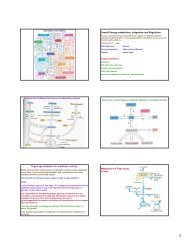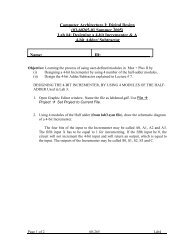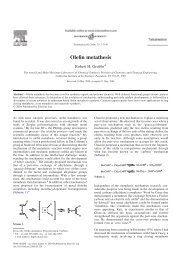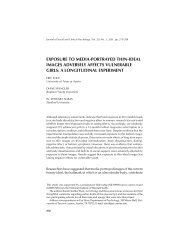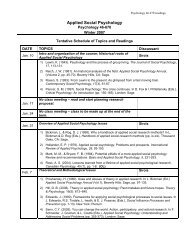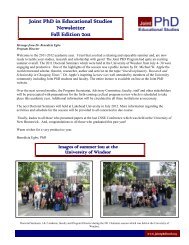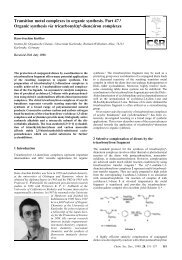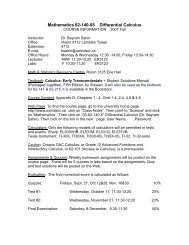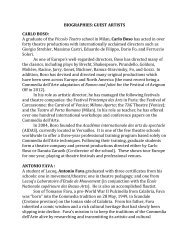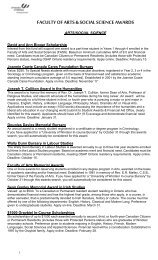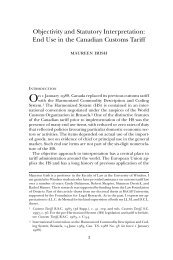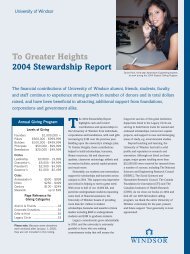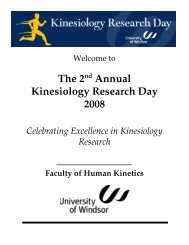Critical Social Work - University of Windsor
Critical Social Work - University of Windsor
Critical Social Work - University of Windsor
You also want an ePaper? Increase the reach of your titles
YUMPU automatically turns print PDFs into web optimized ePapers that Google loves.
Brown<br />
and plurality. However, I have argued that modernist practices <strong>of</strong> power are evident in antioppressive<br />
discourse. I have argued that anti-oppressive social justice based approaches to social<br />
work will be strengthened by abandoning the limitations <strong>of</strong> essentialism, subjectivism and in<br />
avoiding reifying dominant social discourse <strong>of</strong> difference. At the same time anti-oppressive<br />
theory is clearly positioned on the side <strong>of</strong> social justice, and does not hide behind a false veneer<br />
<strong>of</strong> neutrality, except when adopting the “not knowing” position popularized in collaborative<br />
approaches as way to escape the “all knowing” expert position (Anderson, 1997). In this way<br />
anti-oppressive discourse is positioned. It has a point <strong>of</strong> view- it takes a stance. Indeed, its<br />
strength lies primarily in its passionate commitment against oppression. Paradoxical moments,<br />
however, surface as a result <strong>of</strong> the dilemmas <strong>of</strong> multiplicity itself. For while positioned, there is<br />
potential slippage into relativism in the desire to be everywhere at once.<br />
Perhaps the most common critique <strong>of</strong> postmodernism is its focus on multiplicity, on<br />
plurality and difference. In social work, the umbrella approach to recognizing the multiplicity <strong>of</strong><br />
forms <strong>of</strong> oppression within anti-oppressive theory and practice represents the desire to be<br />
everywhere, to be all inclusive. This “pluralist dream <strong>of</strong> being everywhere” has been described<br />
by Bordo (1990) as a new form <strong>of</strong> detachment, or a form <strong>of</strong> neo-objectivism. The focus on<br />
endless difference and the desire to create a “view from everywhere” - representing all positions<br />
equally, has produced a Aview from nowhere. For Haraway (1988), the relativist position “<strong>of</strong><br />
being nowhere while claiming to be everywhere equally” is evident in such constructions<br />
(p.584). Postmodern relativists refuse “to assume a shape for which they must take<br />
responsibility” (Bordo, 1990, p.144). Haraway suggests relativism, like objectivism, is a “god<br />
trick” promising the view from everywhere and nowhere simultaneously. “The equality <strong>of</strong><br />
positioning is a denial <strong>of</strong> responsibility and critical inquiry” (1988, p.65). Anti-oppression<br />
discourse produces objections from some to its postmodern influences - its potential slippage<br />
into relativism and depoliticization through its focus on diversity and multiplicity. Of course,<br />
others object to its modernist influences - its refusal to adopt a position <strong>of</strong> neutrality, and its<br />
subsequent strong stance against oppression. These concerns are echoed by Williams (1999)<br />
regarding the shifts from anti-racist theory/practice to the pluralist anti-oppressive practice.<br />
Examination reveals, however, that anti-oppression discourse is grounded in Western<br />
modernist thought, albeit, with increasing ambivalence. Although more firmly rooted within a<br />
modernist foundation, it is my contention that the epistemology <strong>of</strong> anti-oppression discourse is a<br />
blend <strong>of</strong> modernism and postmodernism. The focus within anti-oppression discourse on<br />
difference and plurality reveals its postmodern leaning. Arguably, the “parts” include gender,<br />
race, class, sexual orientation, and dis-Ability, and these I suggest remain largely reified within<br />
their modernist construction. Similarly, central concepts to anti-oppression discourse such as<br />
experience, knowledge, truth, empowerment, and power remain either problematically<br />
uninterrogated or reflective <strong>of</strong> a modernist conceptual foundation (Brown, 2007a, 2007 b, 2011).<br />
Within a modernist foundation <strong>of</strong> knowledge, positivist truth claims have been rooted not<br />
only in notions <strong>of</strong> objectivity, but in notions <strong>of</strong> sameness, homogeneity, and unification among<br />
individuals, and social groups. Even the left, including feminism, has a not so distant history <strong>of</strong><br />
erasing difference, wishing to elevate the common good, the common goal <strong>of</strong> equality, and social<br />
justice. Influenced by postmodernism, and the politics <strong>of</strong> diversity, these exclusionary practices<br />
have been largely abandoned, replaced instead by an emphasis on difference and diversity<br />
<strong>Critical</strong> <strong>Social</strong> <strong>Work</strong>, 2012 Vol. 13, No. 1<br />
51




